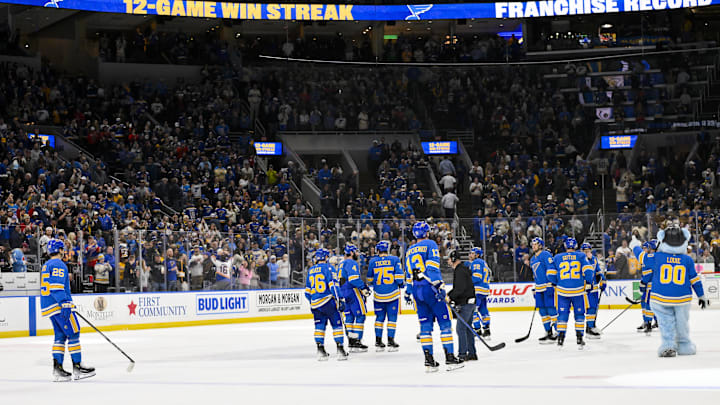The St. Louis Blues are starting up their five-game road trip with a trip up north to Toronto. This is the first extended amount of road games in a row for the current season, but if you can dive back into your memory bank, last season saw a very successful thing happen following a long road trip.
Let's talk about that instance, and how it could happen again in 2025-26 and turn this thing around.
What are we talking about?
Last season, prior to the franchise-record 12-game winning streak, the Blues took a trip for six games. The sixth game was the one that started the streak, in the 5-1 victory in Minnesota.
The prior five games saw the Blues in action against Dallas, Los Angeles twice, Anaheim, and Pittsburgh. They went 2-2-1 on that trip, but the most important thing came after that last loss. The team started their ascent toward the playoffs by throwing caution to the wind and just going for it all.
Fast forward to this season
Looking at the 2025-26 Blues team, it is not anything like it was at the end of last season. When head coach Jim Montgomery came in, the team was cohesive enough to have a pretty good record at the point in the season when the road trip happened. Not like this current campaign, where the Blues cannot get themselves together in any facet of the lineup.
If there was ever a time to right the ship, it is right this second with this matchup in Toronto. Not to say that the Blues will do what they did last season and rattle off another 12-game win streak, but this team can come together with this. There is currently very little accountability, and the growing trend is that this team is just a bounce away from being where they want to be. That could not be any further from the truth.
The goaltending is the main problem, but there are so many sub-classes under that to supplement why this team has been so bad this season. Defensive woes and a lack of leadership from both on the ice and off the ice have made this team a dumpster fire so far.
Whatever happened last season really worked out for the Blues. With a very similar group, who's to say that this unconventional bonding exercise can't be very beneficial for this group?
